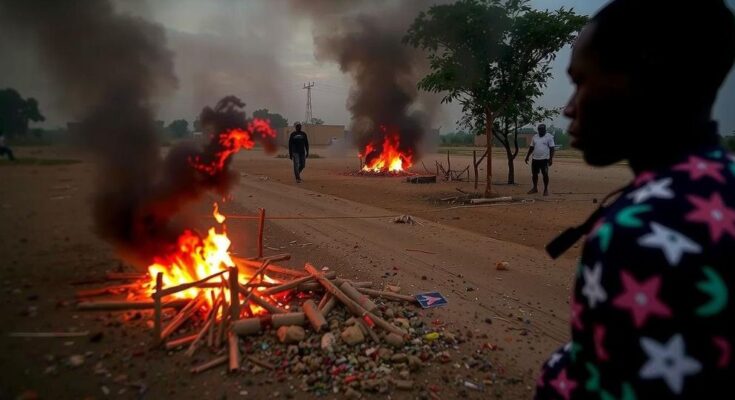Human Rights Watch reported that the Burkina Faso government endangered civilians in August, leading to the deaths of over 100 villagers during a militant attack. Villagers were forced to assist security forces in digging trenches when they were ambushed. The JNIM militant group claimed responsibility, while HRW confirmed substantial casualties. The reliance on civilian militias raises further danger for locals, a situation exacerbated by the military junta’s struggles to reestablish control over the region.
In a chilling report released by Human Rights Watch, Burkina Faso’s government has been accused of recklessly endangering civilians during a recent militant attack. In August, over 100 villagers fell victim to an al-Qaeda-linked group in a grim episode that shook the central region, marking one of the deadliest moments in the ongoing violence. The Barsalogho commune, situated about 80 km from Ouagadougou, had its villagers forcibly enlisted to assist security forces in digging protective trenches. Tragically, this led to their exposure to gunfire from the Jama’at Nusrat al-Islam wal-Muslimin (JNIM) during an unexpected assault. Human Rights Watch confirmed that the attack resulted in at least 133 deaths, including numerous children, with about 200 individuals sustaining injuries. “The Barsalogho massacre is the latest example of atrocities committed by Islamist armed groups against civilians whom the government has exposed to unnecessary risk,” stated Ilaria Allegrozzi, a senior Sahel researcher from HRW. Burkina Faso is increasingly engulfed by militant violence, with half of the nation currently not under government control, and thousands dead or displaced. This surge in attacks has led to two military coups in 2022, with the current junta struggling to restore security despite seeking alliances, including with Russia, for aid against the militant waves. The reliance on civilian militias known as Volunteers for the Defense of the Fatherland (VDP) further complicates the situation, as these civilians often become targets of retaliation from jihadists. Allegrozzi noted that this places the local populace in peril, as they are marked for fighting back against the militants. Eyewitness accounts reveal the Burkinabe army compelled local men to dig trenches under duress, often without compensation. Many fearful of retaliatory attacks resisted, only to be subjected to threats and physical violence from soldiers. Edasso Rodrigue Bayala, the justice minister, countered these allegations by asserting that coerced labor is illegal in Burkina Faso, claiming that the evidence of the army’s forced labor is unsubstantiated. This stark contrast in narratives highlights the intense emotional and physical turmoil faced by citizens caught in a web of conflict, fear, and governmental oversight.
Burkina Faso has been plagued by escalating violence from militant groups, primarily those affiliated with al-Qaeda and the Islamic State. The government has struggled to maintain control as approximately half the country is now beyond its reach. Increasing militant attacks have resulted not only in mass fatalities and displacement but have also set the stage for a volatile political climate characterized by coups and military rule. This ongoing turmoil is compounded by the government’s attempts to mobilize civilian militias for defense, which has unwittingly exposed these civilians to further harm.
Human Rights Watch’s report on the Barsalogho tragedy underscores the precarious situation civilians face amidst Burkina Faso’s rising militant violence. The controversial involvement of security forces and the compulsory enlistment of villagers to fortify defenses have led to dire consequences. As the military junta grapples with its promises to restore safety, the tragic fate of innocent civilians showcases the urgent need for a reassessment of strategies to protect them from unnecessary risk.
Original Source: www.africanews.com



